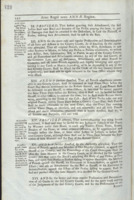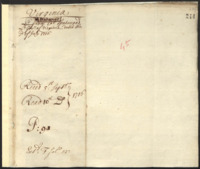A Personal Vendetta: Spotswood’s War on Pirates
Commissioned in 1710, Colonel Alexander Spotswood rapidly embraced the role of Lieutenant Governor of Virginia beginning with legal action. Whilst in command, Lt. Governor Spotswood quickly made use of his authority to advance the war on pirates; moreover, his later actions suggest a deeper resolve to dispense vengeance rather than justice. By the end of his first year, Lt. Governor Spotswood oversaw the ratification of legislation designed to improve the issuance of apprehension warrants for “… Pirate, Rioter, Breaker of the Peace, or other criminal Offenders, to be apprehended and brought before the same, or some other Justice or Justices, on or before the next County Court”.[1] In his quest to impose imperial will throughout Virginia, Lt. Governor Spotswood took advantage of the “Act for the More Effectual Suppression of Piracy” passed in 1700. This act ended the centuries old requirement that all pirates “be returned to England for trial,” thus enabling “Vice-Admiralty courts overseas to hold trials” that not only authorized the use of the death penalty, but rewarded seafarers for resisting pirate attacks.[2] In regards to this legislation, the passage of the aforementioned act made it lawful for any Justice or Justice of the Peace to approve and dispense warrants for apprehending pirates; furthermore, it enabled these warrants to remain public by way of conveyance between counties and justices within the jurisdiction of Lt. Governor Spotswood.
That being said, the determination of Lt. Governor Spotswood to rid the Virginia of piratical threats extends beyond the borders of his governorship and reveals more radical administrative tactics.
On July 3, 1716, in a letter addressed to the Lords Commissioners of Trade (or Board of Trade), Lt. Governor Spotswood expressed his concern, verging on fear, regarding pirate sightings near New Providence – a sparsely populated island in The Bahamas. [3] As a potential pirate hub, Lt. Governor Spotswood urged the Board of Trade to increase naval presence in an effort to stifle the possible development of a secondary pirate nest so close to British trade routes. Intriguingly, Lt. Governor Spotswood admits to sanctioning a manned sloop (a small sea vessel) bound for New Providence in order to gather information, on his behalf, concerning the number of pirates patrolling the waters. Flashing the authority of his station, Spotswood writes, “I judged it incumbent upon me… as having power by a Commission from His late Majesty… to make a particular enquiry into ye state thereof,” based upon intelligence he received further proposing “that proper measures may be taken in time to prevent the ill consequences of suffering such a crew of robbers to fix themselves there”.[4]
Considering that the Bahamian Islands were not under Spotswood’s supervision it is doubtful that such an expenditure would have been approved by the Board of Trade. Supposing that Lt. Governor Spotswood, a loyal subject of the Crown, was simply acting out of patriotic duty, does not support the overt disregard for jurisdictional boundaries. The exchange of information, albiet unwarranted suggests that Spotswood actively searched for message traffic concerning piratical activity in order to involve himself in the war on pirates.
While speculative, further exploration into the correspondence shows apologetic language followed by justification for his actions, albeit commandingly. Spotswood writes, “and I hope what I have done herein,” referencing his commissioned crew to gather intelligence, “will not be reckoned too officious or impertinent, Seeing the Governor of this colony is, by the afore mentioned Commission, entrusted in some measure with the care of those islands, and I hope I may be pardoned if I offer my humble opinion,” unto which Spotswood warns that an indestructible line of defense of both naval protection and imperial settlement is the only way to ensure the success of the Crown.[5] The Admiralty “noted the existence of these pirates, but was not very interested in such small-scale villains so far away,” unbeknownst to them that in just a year, “the Bahamas were destined to become ‘another Madagascar’,” confirming Spotswood’s fears.[6]
Lt. Governor Spotswood undoubtedly established a reputation for himself demonstrating an unwavering hatred for pirates by situating himself in the middle of anti-piracy campaigns. Here, correspondence and legislation highlight just two of the methods in which anti-piracy campaigns manifested. However, the sources presented also illuminate the political disharmony between colonial governorship and imperial administration. Further exploration into Spotswood’s commission as Lieutenant Governor of Virginia indicate a power imbalance concerning political influence within the colonies.
[1] "[[Acts]] of the [[Virginia]] [[Assembly]], 25 October 1710," Legislation, The National Archives, Kew, CO 5/1382 1710/10/25, accessed July 14, 2020, http://www.colonialamerica.amdigital.co.uk.mutex.gmu.edu/Documents/Details/CO_5_1382_039.
[2] David Cordingly, Under the Black Flag: The Romance and the Reality of Life Among Pirates (New York: Random House, 1995), 203-204.
[3] Also referred to as the Board of Trade – Lt. Governor Spotswood addresses the association synonymously throughout his letters.
[4] Lieutenant Governor Alexander Spotswood, correspondence to the Lord Commissioners of Trade, July 3, 1716.
[5] Lieutenant Governor Alexander Spotswood, correspondence to the Lord Commissioners of Trade, July 3, 1716.
[6] Peter Earle, The Pirate Wars (New York: St. Martin’s Press, 2003), 159.

